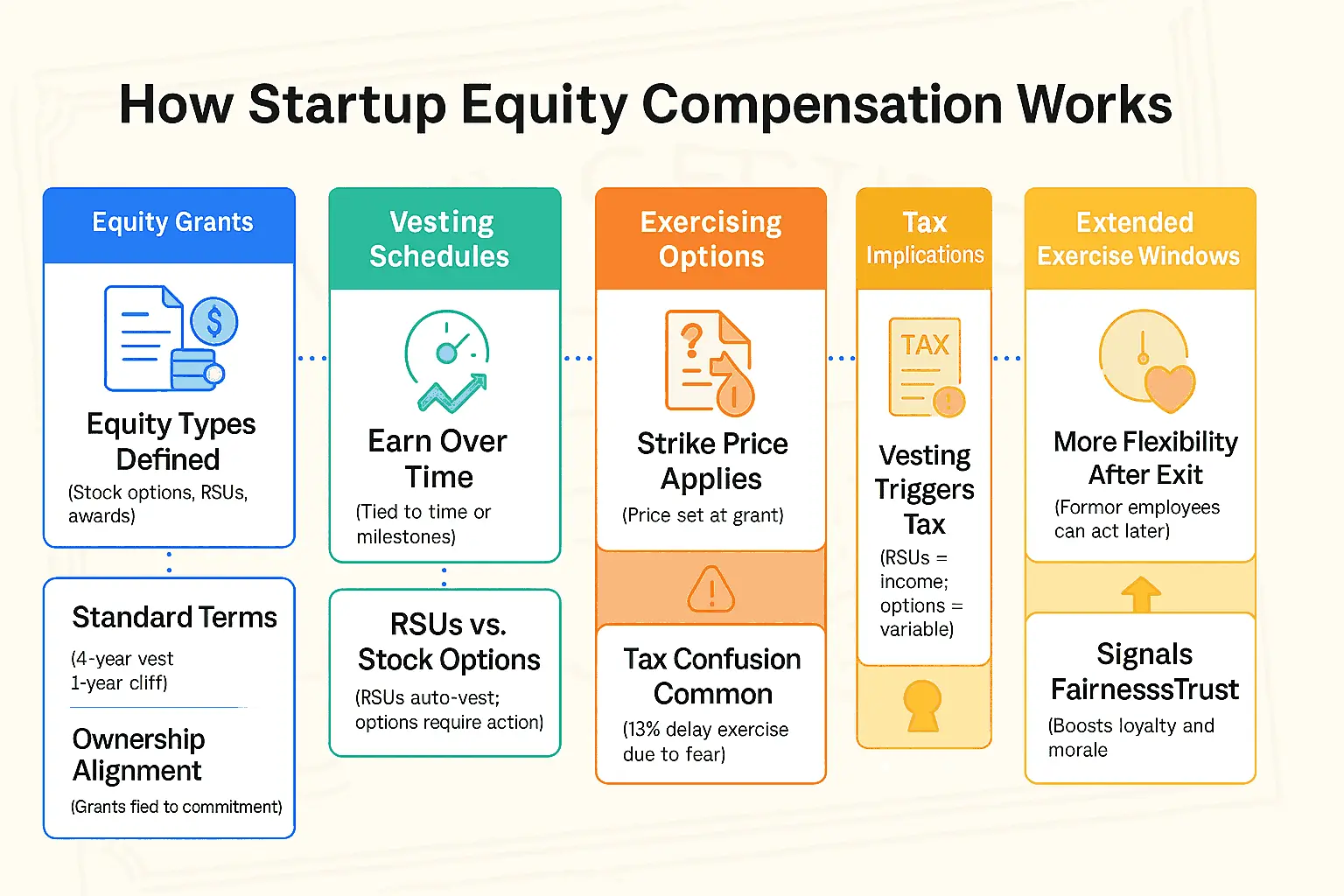As rounds have become more competitive, equity has turned into a core part of startup compensation. In the US, over 80% of venture-backed startups use stock options or other equity plans to attract and retain talent, and employees at successful tech exits often earn a meaningful share of their lifetime wealth from equity, not salary.
At the same time, founders regularly misjudge how much to reserve, when to dilute, and how to balance co-founder stakes with employee pools, which is how you end up with resentment, “forgotten” early contributors, and cap tables nobody wants to touch.
This guide walks through the foundations of founder equity splits, employee option pools, vesting, cliffs, and dilution, so you can structure ownership with intent, not guesswork.
How Startup Equity Compensation Works Step-by-Step
Startup equity compensation is a powerful tool for startups to attract and retain top talent while aligning employee incentives with company growth. It refers to granting shares to founders and employees, most often via stock options, RSUs, or awards, to align incentives and share financial upside.
Recent hiring patterns highlight equity's central role in startup compensation. In early 2024, companies on Carta made more than 60,000 new hires. Equity grants often serve as a foundational incentive in these new roles, ensuring aligned interests and organizational growth.
Let’s break down it’s key components: equity grants, vesting schedules, and the exercise of options:

1. Equity Grants:
Equity grants are formalized through legal agreements. These specify the equity type, such as stock options, RSUs, or restricted awards, and the ownership terms.
For example, equity grants often follow a 4-year vesting schedule with a 1-year cliff, ensuring long-term commitment.
A common structure includes a 4-year vesting schedule with a 1-year cliff, meaning employees must remain with the company for one year before any equity vests. After the cliff, equity typically vests monthly or quarterly over the remaining years.
Vesting equity ensures that employees earn their shares over time, protecting both the company and its team.
2. Vesting Schedules: Timing Ownership
Vesting schedules ensure employees earn their equity gradually, incentivizing long-term commitment. For example, RSUs often vest based on time or performance milestones, while stock options require employees to actively exercise their rights to purchase shares.
2. Exercising Stock Options: A Complex Process
Exercising stock options involves purchasing shares at a predetermined price, known as the strike price. However, this process can be daunting due to potential tax implications. According to a Carta study, 13% of respondents avoided exercising their options due to fear of making mistakes or misunderstanding ownership. Educating employees on the process, including tax consequences, is crucial for maximizing the benefits of equity compensation.
4. Tax Implications: What to Expect
Equity compensation comes with varied tax consequences depending on the instrument. For instance, RSUs are taxed as ordinary income upon vesting, while stock options may trigger taxes at exercise or sale. Consulting a tax advisor can help employees navigate these complexities effectively.
Equity compensation, whether through stock options or RSUs, plays a critical role in aligning employee incentives with company success.
Why Extended Exercise Windows Matter
Building on the exercise process, startups increasingly offer extended post-termination windows for stock option exercise. This strategy allows departing employees more time to convert options into shares, reducing pressure and improving fairness. Longer windows can enhance retention and trust, as employees feel valued beyond their tenure. Companies adopting this approach signal a commitment to equitable treatment and long-term relationships.
How to Calculate Your Equity Allocation
Determining the right equity allocation requires a balance between industry standards and the unique needs of your startup. Startups typically reserve 13%-20% of their equity pool for employee compensation, as highlighted in the Carta report. This benchmark ensures competitive offerings while maintaining sufficient equity for founders and investors.
Quantitative Models for Fair Allocation
Using quantitative methods can help allocate equity fairly based on role and contribution. For example, senior leadership roles often receive higher percentages due to their strategic impact, while junior roles might receive smaller allocations. These models ensure transparency and consistency in equity distribution. Before you sign a term sheet, search equity or revenue share for startups to match model to churn risk, LTV/CAC, and predictability..
Why Equity Compensation Benefits Both Companies and Employees
Startup equity compensation provides a strategic advantage by helping your business attract and retain top talent while conserving cash flow. For employees, employee equity fosters a sense of ownership and aligns their interests with the company’s long-term success.
In a 2021 cohort, 43.4% of employees hired left within two years. This finding demonstrates how structured equity plans must be paired with strong engagement strategies.
You can gain a Equity strategic advantage through SEC as it help your business to attract and retain top talent while conserving cash flow. By providing employees with ownership stakes, companies can enhance their compensation packages without increasing immediate financial outlays. This approach is particularly beneficial for startups or organizations looking to reinvest operating capital into growth initiatives.
Risks Employees Should Consider
While equity compensation offers significant upside, employees should recognize the risks involved. Most startups do not achieve successful exits, making vesting schedules and exit timing crucial to maximizing value. Understanding potential tax liabilities before accepting an equity offer helps avoid surprises. Informed decisions protect employees from unforeseen financial consequences and align expectations with reality.
Additionally, equity compensation provides significant upside potential for employees. If the company’s valuation rises, their ownership stakes can translate into substantial financial rewards, making this form of compensation both motivating and rewarding.
By aligning the goals of employees and employers, equity compensation becomes a powerful tool for fostering loyalty and driving mutual success. For companies considering external funding options, a balanced examination of investment dynamics emerges from the pros and cons of sovereign investments, offering insights that help you weigh the impact of such funding on equity configurations.
Structuring an Equity Compensation Plan: Key Considerations
Designing a startup equity compensation plan requires careful attention to regulatory, fiscal, and strategic factors. Structural changes impact equity strategy. Between 2018 and 2025, manager representation decreased from 46% to 39% for companies under $100M. This trend underscores the need to anticipate shifts as you plan future equity allocations.
Look at the key considerations below before drafting a equity compensation plan:
1. Prioritize Exit Strategy Planning
An effective exit strategy ensures that equity dilution surprises are minimized, preserving employee confidence. Companies should anticipate scenarios like acquisitions or public offerings and align equity plans accordingly. For instance, Robinhood’s innovative valuation methodology before its IPO helped establish credibility with employees, achieving a $7.6 billion valuation at Series G in 2020.
2. Understand Tax Implications of Equity Instruments
Different equity instruments, such as stock options or restricted stock units (RSUs), come with varied tax treatments. Seeking professional advice is essential to optimize tax strategies for both the company and its employees. Missteps in this area can lead to unnecessary tax burdens, reducing the perceived value of equity compensation.
3. Establish Consistent Vesting Schedules
Robust vesting schedules are critical for maintaining employee engagement over time. Whether opting for time-based or milestone-based vesting, consistency ensures fairness and motivates employees to stay invested in the company’s growth.
For insights into regulatory considerations, explore the discussion on legal issues with sovereign investments, which highlights compliance frameworks that intersect with equity structuring.
4. Document Founder Equity Splits Early
Beyond regulatory and operational planning, founders must address equity splits transparently from the outset. Early discussions about ownership percentages, roles, and contributions help prevent misunderstandings and future disputes. Documenting these agreements in writing ensures clarity as the company evolves, reducing the risk of misalignment when new investors or team members join.
A clear founder equity split reflects each person's commitment and value creation, supporting long-term collaboration. This approach builds trust among co-founders and signals professionalism to potential investors. By establishing ownership terms before major milestones, startups can avoid contentious renegotiations that distract from growth.
Founders should revisit equity splits periodically as responsibilities shift or new contributors join. Open communication and documented changes maintain alignment and foster a culture of fairness. This strategic step is essential for sustaining healthy founder relationships and supporting the company's vision.
When to Offer Equity Compensation
Deciding when to offer equity compensation can make or break your startup’s ability to attract and retain top talent.
- In the early stage, grant equity to founders and first hires to ensure they share in long-term upside when cash is tight. This initial pool signals commitment and aligns everyone’s interests from day one.
- After a major funding round, revisit your equity compensation plan: fresh capital unlocks new pools for mid-level hires and key executives.
- At strategic milestones, such as product launches or market expansions, adding performance-based grants can motivate teams to hit critical goals.
Timing equity awards alongside external funding sources also matters. Programs like government-backed investment programs startups can influence your equity timing by supplementing cash reserves and affecting dilution calculations.
Your Options for Structuring Equity Compensation
Equity options startup plans play a pivotal role in attracting and retaining top talent, especially for startups aiming to align employee incentives with long-term goals. For example, equity options startup plans often grant employees the right to purchase company shares at a predetermined price.
1. Stock Options
Stock options grant employees the right to purchase company shares at a predetermined price, often below market value. They offer flexibility but require employees to invest upfront, which can be a drawback for some.
Exercise rates are shifting. By late 2024, only 32% of vested in-the-money options were exercised. This rate is down from 54% just a few years ago, reflecting evolving employee priorities.
2. Restricted Stock Units (RSUs)
RSUs are a promise of future shares, typically tied to vesting schedules. Unlike stock options, employees don’t need to purchase shares, making RSUs less risky and more appealing for certain roles.
3. Restricted Stock Awards
These awards provide immediate ownership of shares, often with restrictions tied to performance or tenure. They are ideal for incentivizing long-term commitment.
4. Performance Shares
Performance shares are contingent on achieving specific milestones, aligning compensation with measurable outcomes.
Use Digital Tools to Manage Equity Effectively
Digital platforms have transformed how businesses approach equity compensation strategy. Tools like Carta simplify complex processes, offering enhanced visibility into equity data and enabling efficient cap table management. With features designed to benchmark equity allocation, these platforms help startups maintain competitive and transparent equity structures.
For example, the Carta Equity Report can validate whether your startup’s equity structure aligns with industry standards. This tool is particularly useful for determining appropriate employee equity pools before funding rounds, ensuring your equity strategy remains both accurate and effective.
By adopting digital equity management solutions, companies can streamline operations, reduce errors, and make informed decisions about equity pools. These platforms also provide benchmarking tools that support strategic planning, helping businesses stay ahead in competitive markets.
How to Handle Tax Reporting for Equity Issuance
Accurate tax reporting requirements are crucial for businesses issuing equity to employees or stakeholders. Missteps in this area can lead to costly penalties and compliance issues. To ensure proper adherence to IRS regulations, companies must prioritize precision in their reporting processes.
One essential guideline is the 409A valuation, which establishes the fair market value of equity awards. This valuation plays a pivotal role in determining the tax implications for recipients and helps businesses avoid underreporting or overreporting taxable income. Additionally, maintaining meticulous records and consulting tax professionals can safeguard against errors.
Reliable reporting is key for stability. In May 2024, involuntary departures decreased 38% since January. Consistent compliance with IRS guidelines helps safeguard teams and support retention.
By focusing on compliance and accuracy, businesses can protect themselves from legal complications while fostering trust with their stakeholders.
Conclusion
A thoughtful equity compensation plan is more than just a financial tool; it’s a strategic asset for fostering employee engagement and driving company success. Throughout this guide, we’ve explored essential strategies, including equity allocation, vesting schedules, and tax planning, all of which play a pivotal role in creating a sustainable and motivating framework.
Implementing these strategies with a clear, data-driven approach ensures that your equity plans align with both employee expectations and organizational goals. By prioritizing transparency and precision, businesses can optimize their compensation plans to fuel growth and innovation.
If you're ready to align your equity strategy with robust funding initiatives, we invite you to explore our Fundraising Assistance Service at Qubit Capital. Let us help you take the next step in building a thriving, well-compensated team while driving your company forward.
Key Takeaways
- Equity grants are a key part of startup equity compensation, tying your upside directly to the company’s trajectory.
- Most companies earmark 13 – 20 % of the cap table for an option pool, giving you—and future teammates—a meaningful stake while keeping founder dilution at tolerable levels.
- Vesting equity with a four-year schedule and one-year cliff safeguards both sides, ensuring commitment and protecting company interests.
- Taxes and securities rules differ by jurisdiction and option type; working closely with counsel and accountants early helps you sidestep surprise bills or filing penalties down the road.
- Modern cap-table tools like Carta swap opaque spreadsheets for live dashboards that track strike prices, exercisable shares, and dilution scenarios, so you always know where you stand before raises, exercises, or exits.
Frequently asked Questions
What is an equity grant in a startup?
An equity grant is a formal agreement that gives employees or founders ownership in a startup. It details share type, vesting terms, and legal rights. Equity grants align incentives and help attract talent.






